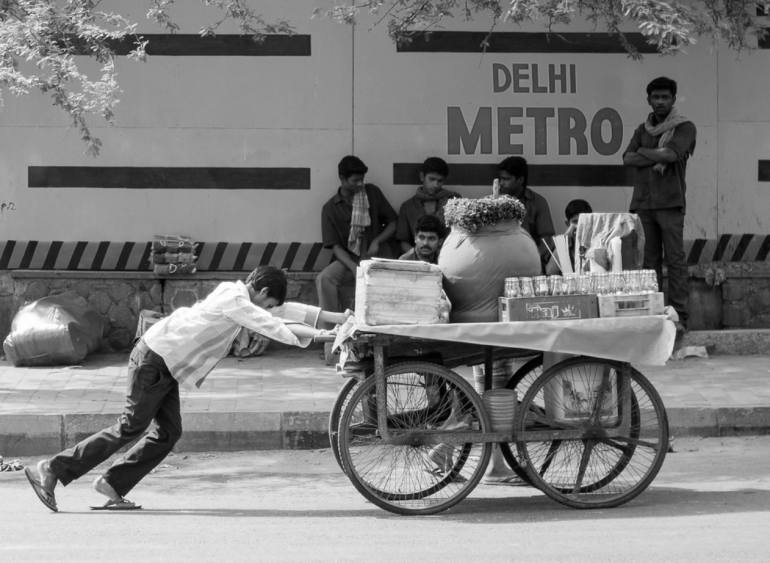Nun’s act of kindness inspires a street hawker to gift sprouted saplings to customers

Ladislaus Louis D’Souza writes about a real-life story of how things changed when a nun went an extra mile to help a young street hawker in despair. Names are changed for reasons of privacy.
“Ultimately, the only wealth that can sustain any community, economy or nation is derived from the photosynthetic process – green plants growing on regenerating soil.” – Allan Savory
With the pandemic apparently in recession mode and the lockdown steadily unlocking worldwide, here’s a story that can instill “hope…eternal in the human breast” (Alexander Pope) across our continent.
One sunny morning, a rare sight greeted the regular customers of Sameer, a wayside Tender-coconut seller in a city suburb. What was unusual was that the pushcart (kiosk) had two sections, one side displaying tender-coconuts for sale and the other, tender-coconut shells sprouting saplings to be given away for free. Every customer that patronized Sameer’s stall was presented with a free sapling.
“Hey, what’s this? I mean – how come?” stuttered Rishabh, who had noticed that Sameer and his pushcart had been missing for two full days. The next thing Rishabh knew was that he was standing stunned as he listened to Sameer’s jaw-dropping narrative.
Sameer said he was taken unawares when suddenly, as if from nowhere, swooped a municipal van on him and in an instant disappeared with the pushcart, tender coconuts and all the cart belongings, leaving him in tears. He had lost the very source of his income that enabled him to help his poor laborer-parents to feed their brood of four.
Not knowing what to do, he squatted on the pavement with his head between his knees, weeping helplessly.
Sister Mallika from the nearby convent, who would occasionally stop by in the evenings to pick up an ice-candy for an old Sister way back at the convent, was on her way to the railway station for a train to her college. One glance at the hunched figure, and she instinctively knew what had happened and, more importantly, what she had to do. Gently tapping him on his shoulder, she said, “Sameer beta, Chalo, utho. Aa jao mere saath.” (Hello, Sameer, get up, today come with me).
Abandoning her trip to college for the day, Sister Mallika briskly walked Sameer to the convent. The nun promptly met her Sister Superior and explained the situation. She got the still weeping lad some breakfast and then got to work out a plan of action that included using her contacts with those associated with the municipality to somehow try and retrieve at least the pushcart for the boy.
In the meanwhile, she asked Sameer if he’d like to potter around in the garden, helping to clear paths, water the plants, trim the hedges – whatever he felt like doing. Wonder of wonders, the boy seemed to develop a smile on his face just going around the garden.
Treating the lad to lunch later, the sisters asked him whether he’d like to come regularly to work in the convent garden or would prefer selling Tender Coconuts as he was so used to doing. Sameer was prompt to opt for the latter but asked whether he could come until he could find a solution to his dilemma. That is when Sister Mallika had a brainwave. When leaving for home, he was given some packed food for his family to tide over the crisis.
The following day, giving the boy a sack, Sister Mallika advised him to go and collect whatever empty tender coconut shells he could find at his sale spot and bring them across, which he swiftly did. Then taking him to the little nursery at the rear of the garden, the nun showed him the saplings and suggested that he try nestling some of those in the empty tender coconut shells with mud and manure and then, not sell them but to give them gratis (free in gratitude) to his customers.
Sameer was overjoyed at the suggestion, but it suddenly dawned on him that he had no pushcart. As he was about to express himself, the pushcart was dropped off at the convent gate by the municipal raiding van—complete with a license plate affixed to it.
Sister Mallika’s contacts had gone the extra mile to return Sameer’s source of livelihood to him with all the needed government paperwork. Sister Mallika’s act of generosity ignited a mission in Sameer – to give away free sapling to his customers and promote a love for environment.
Radio Veritas Asia (RVA), a media platform of the Catholic Church, aims to share Christ. RVA started in 1969 as a continental Catholic radio station to serve Asian countries in their respective local language, thus earning the tag “the Voice of Asian Christianity.” Responding to the emerging context, RVA embraced media platforms to connect with the global Asian audience via its 21 language websites and various social media platforms.











